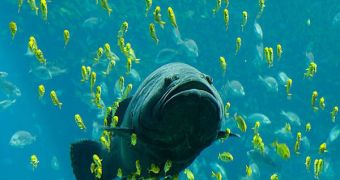University of British Columbia (UBC) investigators say that fish living in the ocean will become smaller and smaller over the coming decades, as global warming and climate change continue to exert their widespread effects on the world.
Both oceanic and atmospheric systems are currently experiencing significant changes. In addition to falling under the influence of global warming, they also influence each other heavily, so any changes affecting one will automatically affect the other as well.
The full investigation is detailed in the latest issue of the top scientific journal Nature Climate Change. The work was led by UBC fisheries scientists, who make up the first-ever group of scientists to offer a prediction of how a warmer and less-oxygenated ocean will influence the physical size of fish.
Another important factor affecting the world's waters is oceanic acidification, which occurs as more and more carbon dioxide is absorbed from the atmosphere by phytoplankton in the oceans.
This leads to the formation of large amounts of carbonic acid within the waters, which decreases pH levels, and makes it more difficult for many species to survive. Creatures that build their own hard shells out of calcium carbonate are the most severely affected.
Between 2000 and 2050, the maximum body weight of more than 600 fish species could decline by 14 to 20 percent, the team found. The study is based on a complex computer model, which also showed that marine creatures living at the tropics will experience the most severe effects.
“We were surprised to see such a large decrease in fish size. Marine fish are generally known to respond to climate change through changing distribution and seasonality,” explains William Cheung.
“But the unexpectedly big effect that climate change could have on body size suggests that we may be missing a big piece of the puzzle of understanding climate change effects in the ocean,” he adds.
Cheung, an assistant professor at the UBC Fisheries Center, was the lead author of the investigation.
He concludes by saying that the study is the first to actually test a theory that claims that fish growth is limited by oxygen supply. “It’s a constant challenge for fish to get enough oxygen from water to grow, and the situation gets worse as fish get bigger,” says study coauthor, Daniel Pauly.

 14 DAY TRIAL //
14 DAY TRIAL //